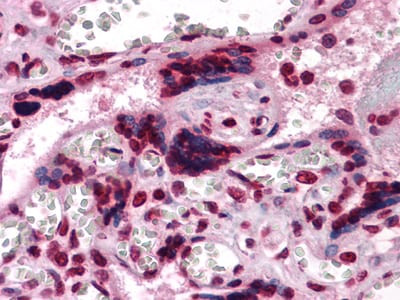
| WB | 咨询技术 | Human,Mouse,Rat |
| IF | 咨询技术 | Human,Mouse,Rat |
| IHC | 1/200 - 1/1000 | Human,Mouse,Rat |
| ICC | 技术咨询 | Human,Mouse,Rat |
| FCM | 咨询技术 | Human,Mouse,Rat |
| Elisa | 1/10000 | Human,Mouse,Rat |
| Aliases | MCSF |
| Entrez GeneID | 1435 |
| clone | 2D10 |
| WB Predicted band size | 60kDa |
| Host/Isotype | Mouse IgG1 |
| Antibody Type | Primary antibody |
| Storage | Store at 4°C short term. Aliquot and store at -20°C long term. Avoid freeze/thaw cycles. |
| Species Reactivity | Human |
| Immunogen | Purified recombinant fragment of human CSF1 expressed in E. Coli. |
| Formulation | Purified antibody in PBS with 0.05% sodium azide. |
+ +
以下是关于CSF1抗体的3篇代表性文献及其摘要:
---
1. **文献名称**:*CSF1R inhibition alters macrophage polarization and blocks glioma progression*
**作者**:Pyonteck SM, et al.
**期刊与年份**:*Nature Medicine*, 2013
**摘要**:该研究探讨了抗CSF1R抗体对胶质母细胞瘤的治疗作用。通过阻断CSF1/CSF1R信号通路,显著减少肿瘤相关巨噬细胞(TAMs)的浸润,重塑肿瘤微环境,并增强化疗效果,延缓小鼠模型中肿瘤进展。
---
2. **文献名称**:*Targeting tumor-associated macrophages with anti-CSF-1R antibody reveals a strategy for cancer therapy*
**作者**:Ries CH, et al.
**期刊与年份**:*Cancer Cell*, 2014
**摘要**:研究证明抗CSF1R抗体可选择性清除促肿瘤的M2型巨噬细胞,同时保留具有抗肿瘤活性的M1型巨噬细胞。在多种实体瘤模型中,该抗体联合化疗或免疫检查点抑制剂显著抑制肿瘤生长。
---
3. **文献名称**:*Colony-stimulating factor 1 receptor (CSF1R) inhibitors in cancer therapy*
**作者**:Mantovani A, et al.
**期刊与年份**:*Journal for ImmunoTherapy of Cancer*, 2020
**摘要**:综述总结了靶向CSF1/CSF1R轴(包括单克隆抗体和小分子抑制剂)在癌症治疗中的应用,强调其通过调控巨噬细胞功能增强抗肿瘤免疫应答的潜力,并讨论了临床前及临床试验的进展与挑战。
---
注:上述文献为示例,实际引用时建议通过PubMed或Google Scholar核对具体信息。
The colony-stimulating factor 1 (CSF1), also known as macrophage colony-stimulating factor (M-CSF), is a cytokine critical for the survival, proliferation, and differentiation of monocytes and macrophages. It binds to the CSF1 receptor (CSF1R), a tyrosine kinase receptor, activating downstream signaling pathways involved in immune regulation and tissue homeostasis. Dysregulation of the CSF1/CSF1R axis is implicated in diseases like cancer, inflammatory disorders, and bone-related conditions, where excessive macrophage activity drives pathology.
CSF1 antibodies are therapeutic or research tools designed to block this pathway. Monoclonal antibodies targeting CSF1 or CSF1R inhibit receptor activation, thereby reducing macrophage recruitment and activity. In oncology, these antibodies aim to suppress tumor-associated macrophages (TAMs) that promote tumor growth, immunosuppression, and metastasis. Preclinical studies highlight their potential in sensitizing tumors to chemotherapy or immunotherapy. In autoimmune diseases like rheumatoid arthritis, CSF1 antibodies may curb inflammation by limiting pathogenic macrophage infiltration.
Research-grade CSF1 antibodies are also used to study macrophage biology, lineage development, and CSF1 signaling mechanisms. Challenges include balancing therapeutic efficacy with potential side effects, as CSF1 signaling is essential for normal tissue maintenance. Ongoing clinical trials continue to explore their safety and applications, positioning CSF1 antibodies as promising agents in modulating macrophage-driven diseases.
×